Fuel Line Pliers
Quality, durable, precise machined fuel line pliers.
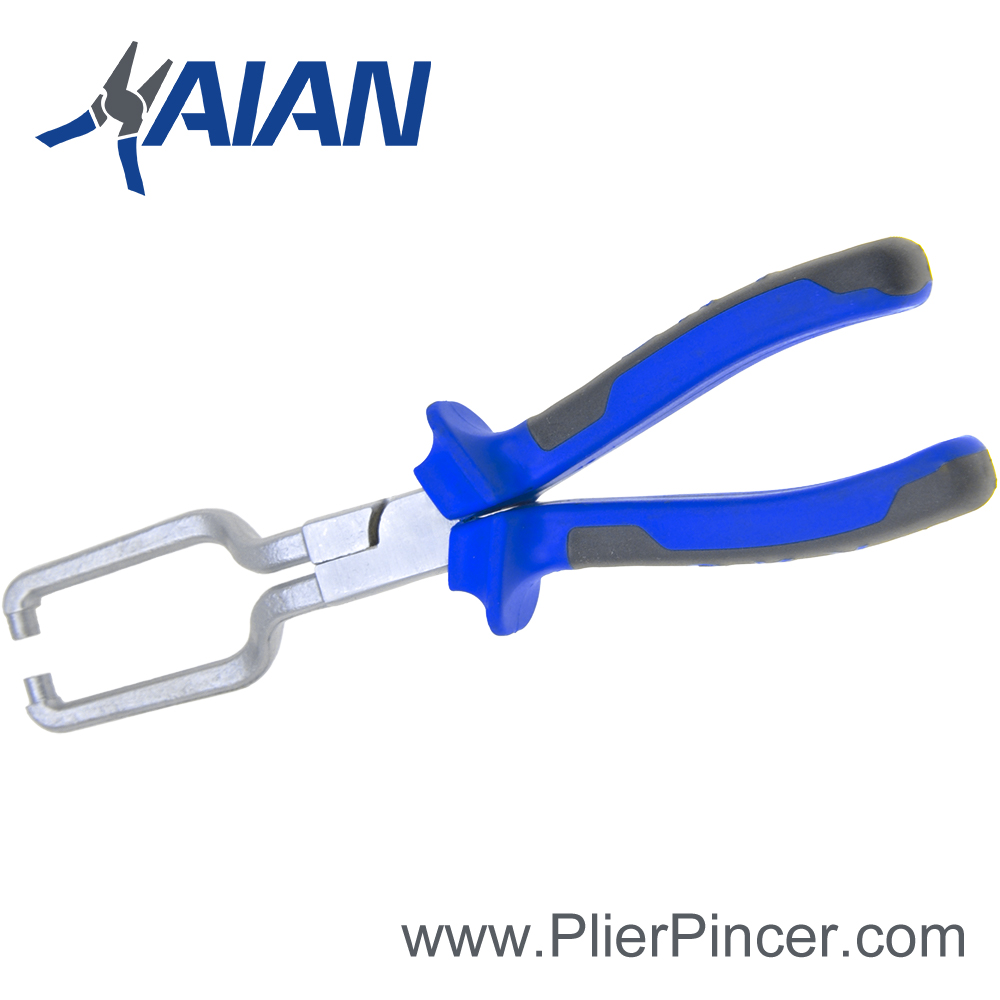
Item No.: HA210636
Size: 9″ | 223mm
Max Opening: 4.72″ | 120mm
Material: Carbon Steel, Drop Forged and Hardened
Surface Finishing: Peal Nickel Plated
Handles: Bi-Color TPR Handles
Packaging: Blister Card
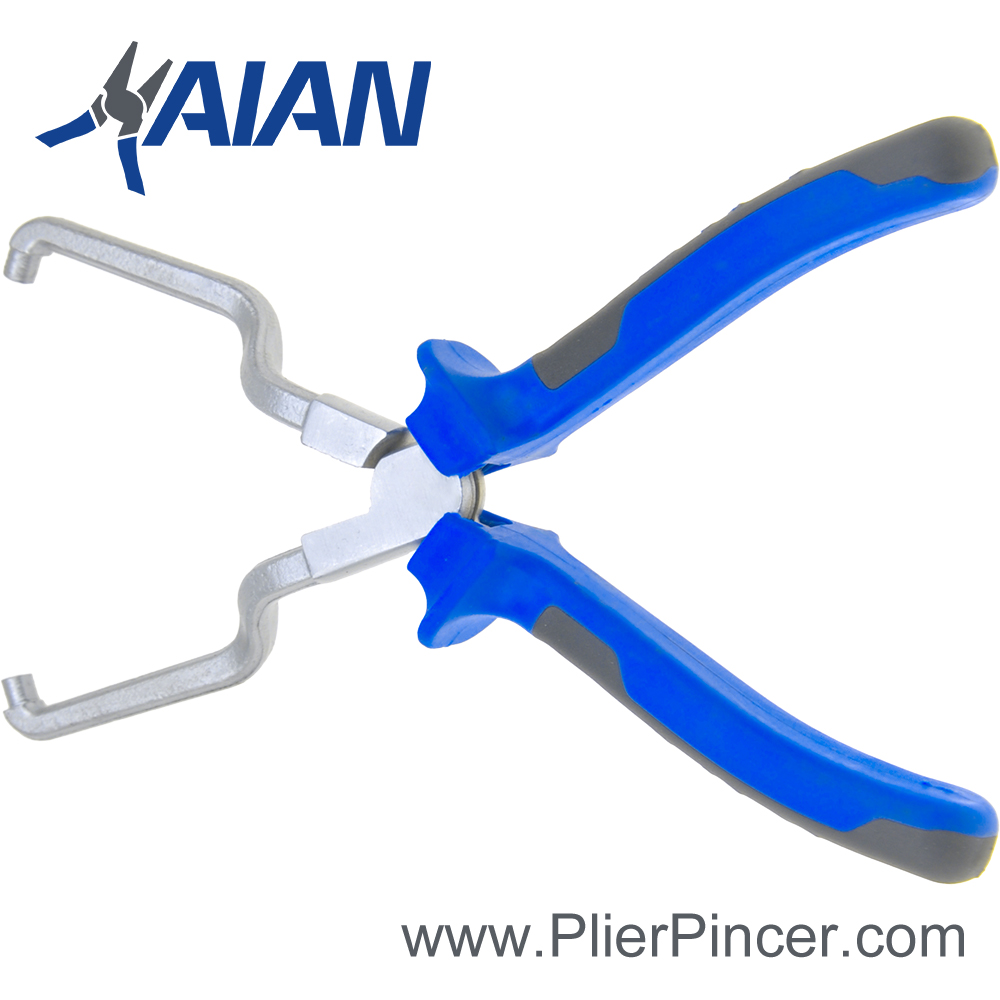
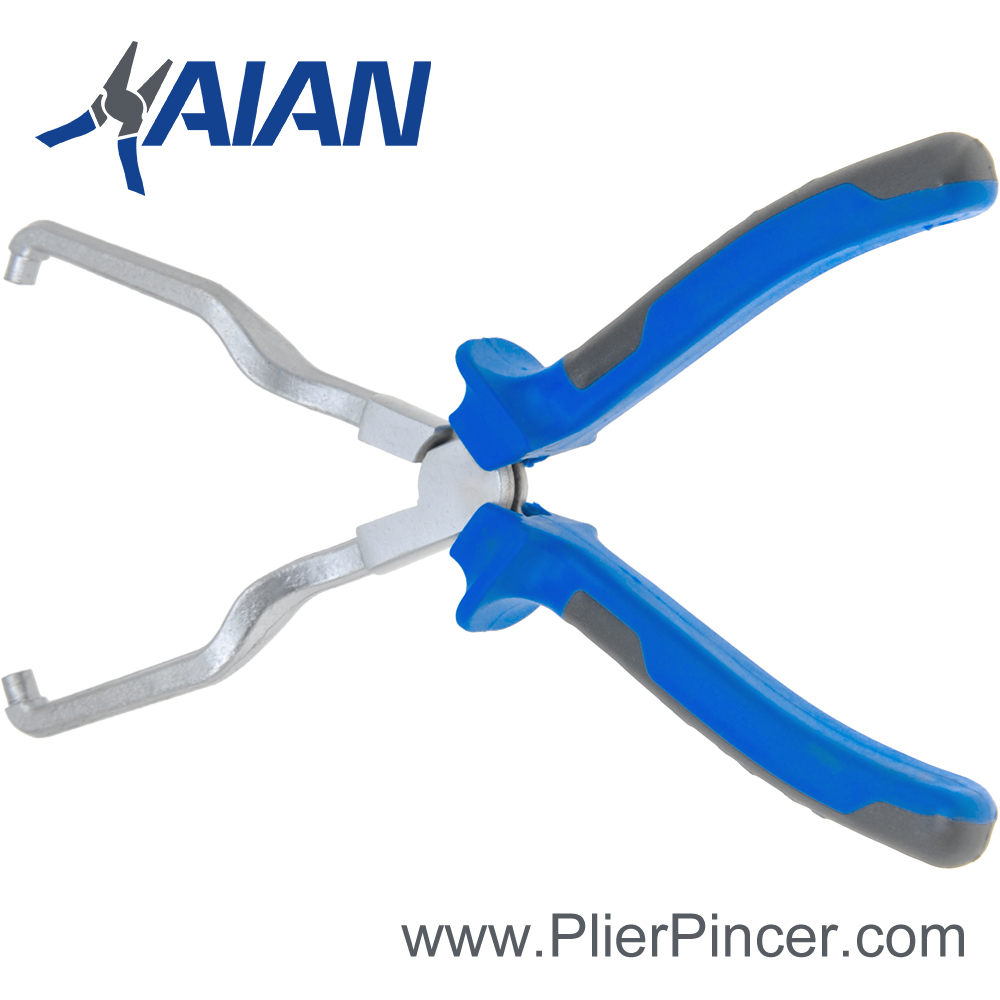
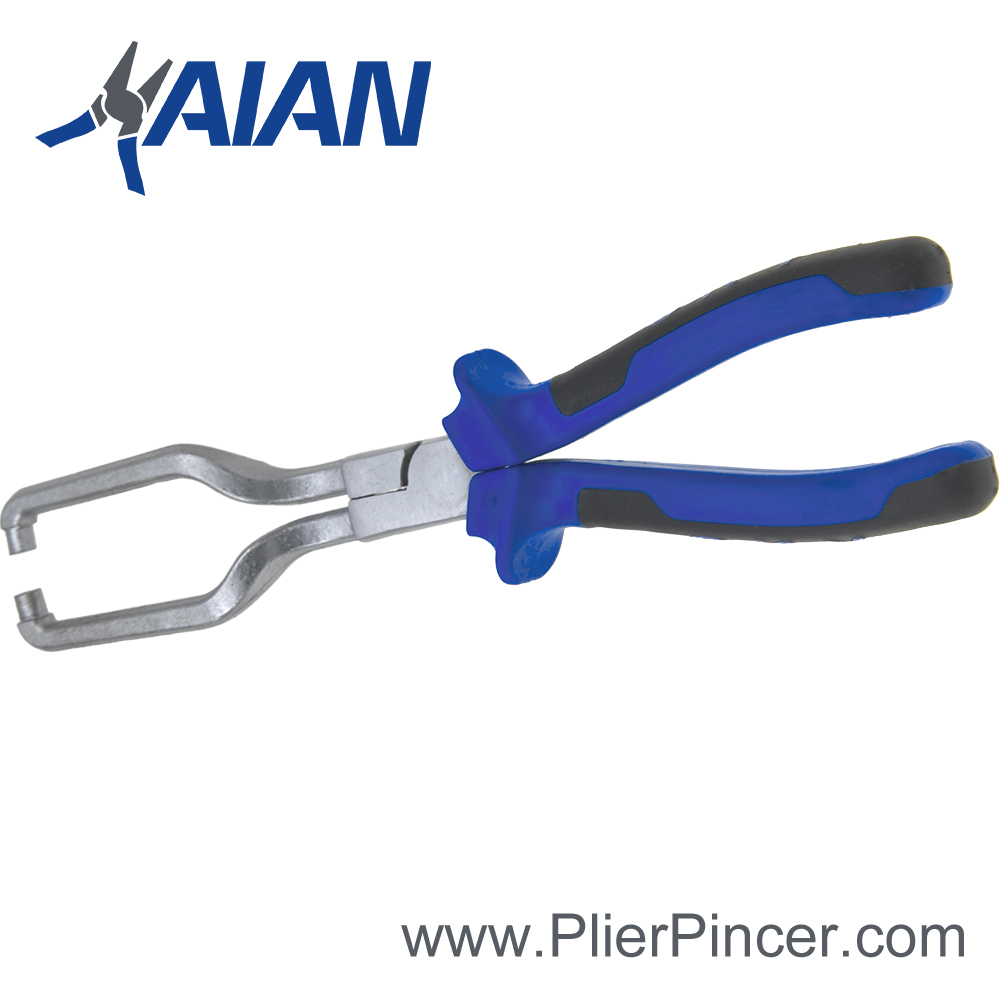
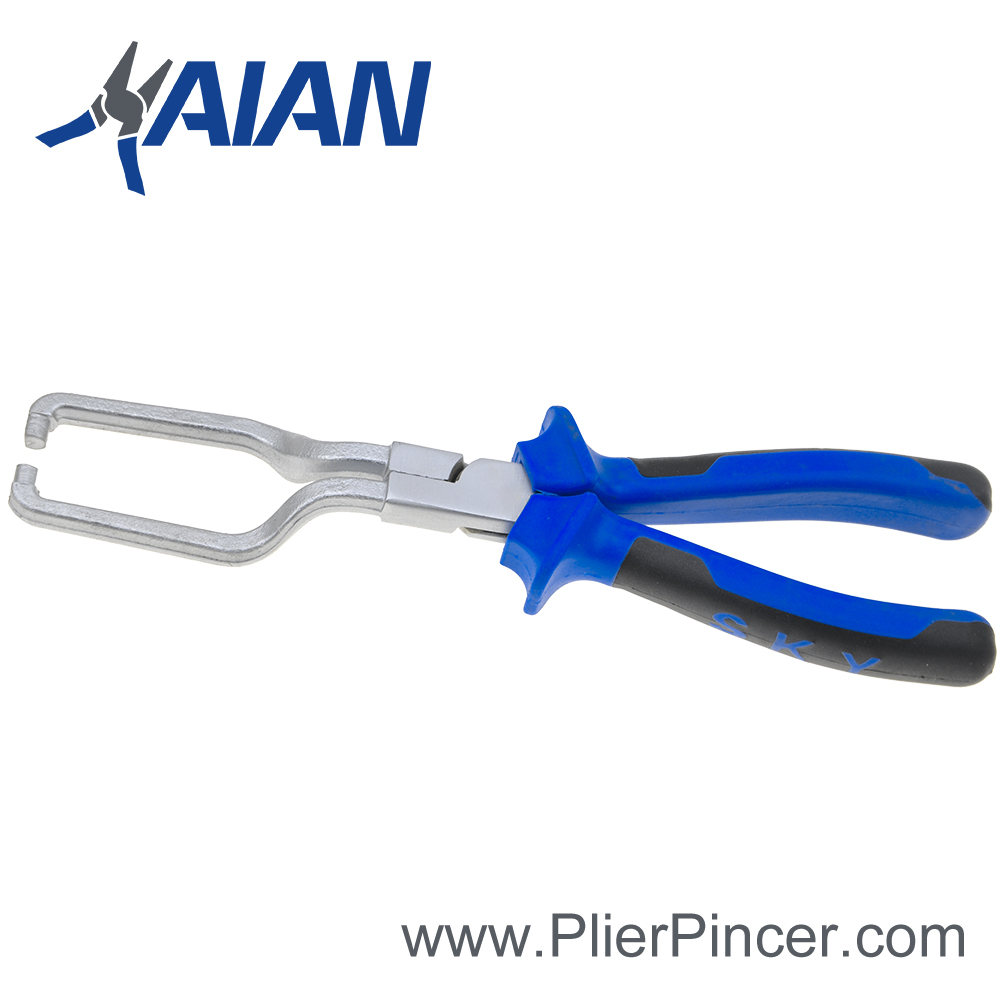
Also named Fuel Line Clip Removal Pliers
Use to remove hoses, moldings, clips, clamps, seals, O-rings, cotter pins, gaskets, and more.
Formed tips fit easily between hose and fitting to break stubborn hoses loose.
Includes long and short shafts 8 to 13 inches with standard and offset hooks.
Tri lobular grips provides exceptional pulling and twisting force.
Shafts are heat-treated for strength, and plated for durability.
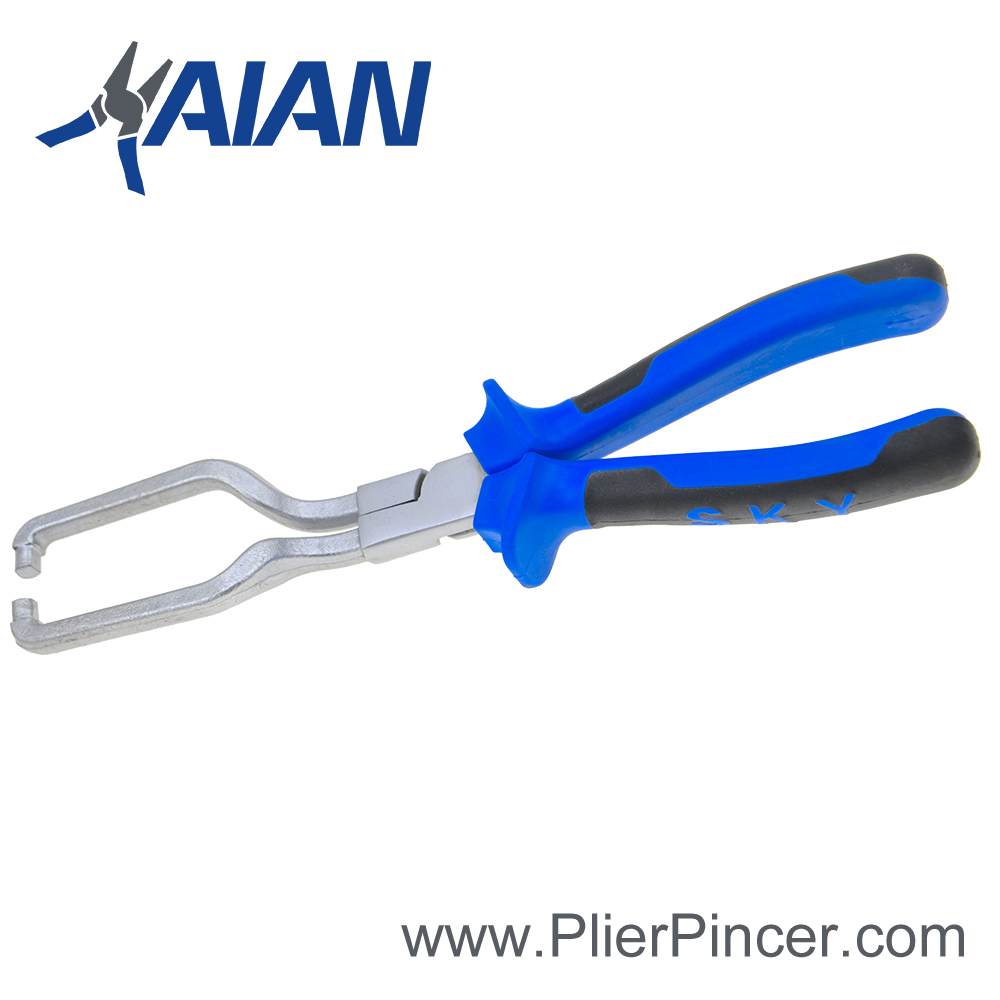
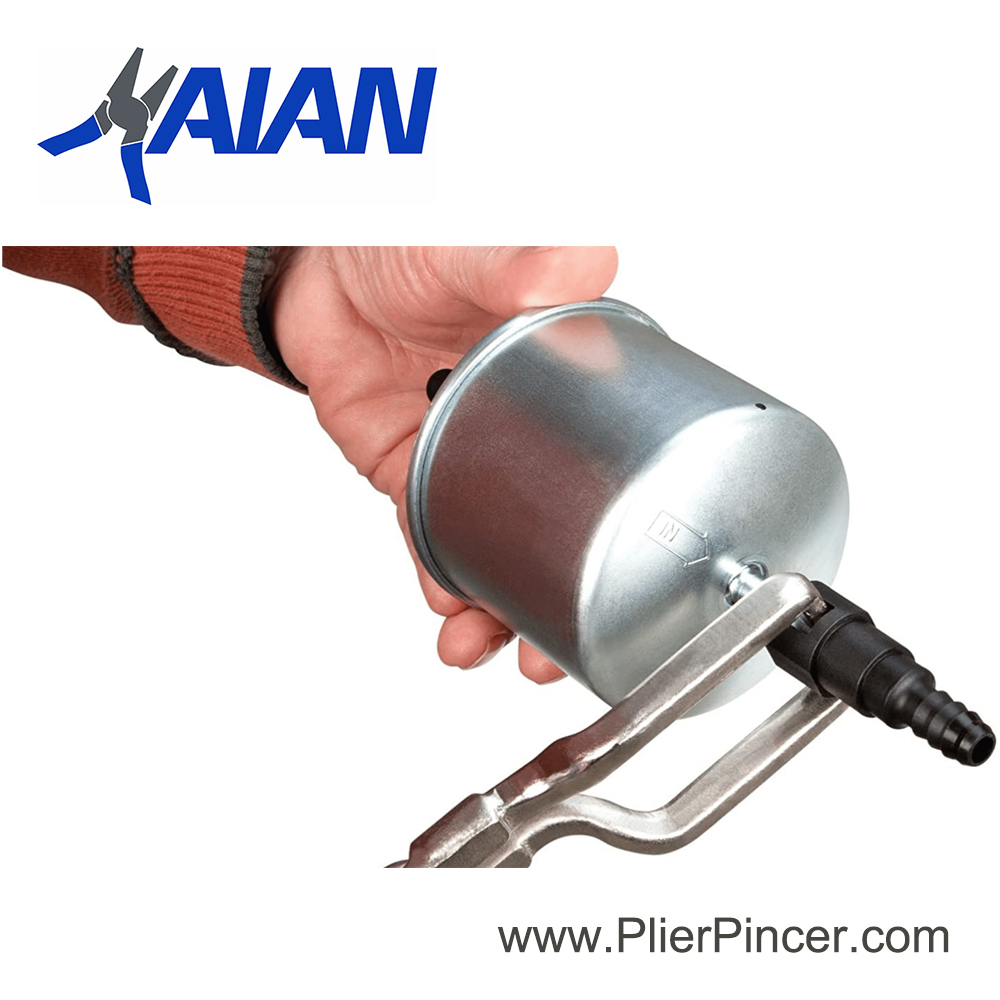
Special Application
These pliers are designed for quick connect, slide and lock couplers found on fuel lines found on European and Domestic vehicles
Applications include Audi, GM, Mercedes including M- class, Toyota and VW models
Also can pull fuel and vacuum hoses on Mercedes
For releasing connections on fuel lines during maintenance or when replacing fuel filters.
Designed to compress the quick disconnect lugs without damaging the connector.
Works on: VW and Audi fuel lines with plastic snap-together connectors; Mercedes M-Class fuel filters; Ford, Mazda, Fiat, GM, and BMW’s with gas powered engines.
Perfect tool for releasing connections on fuel pipes during engine service or when replacing fuel filters
Specially made tip pliers is designed to compress the quick connect lugs for easy removal without damaging the connectors
Made of high grade hardened tool steel
Ergonomic comfort-grip handle
Applications: VW, Audi, Fiat, GM, Opel, Vauxhall, Mercedes-Benz and etc.
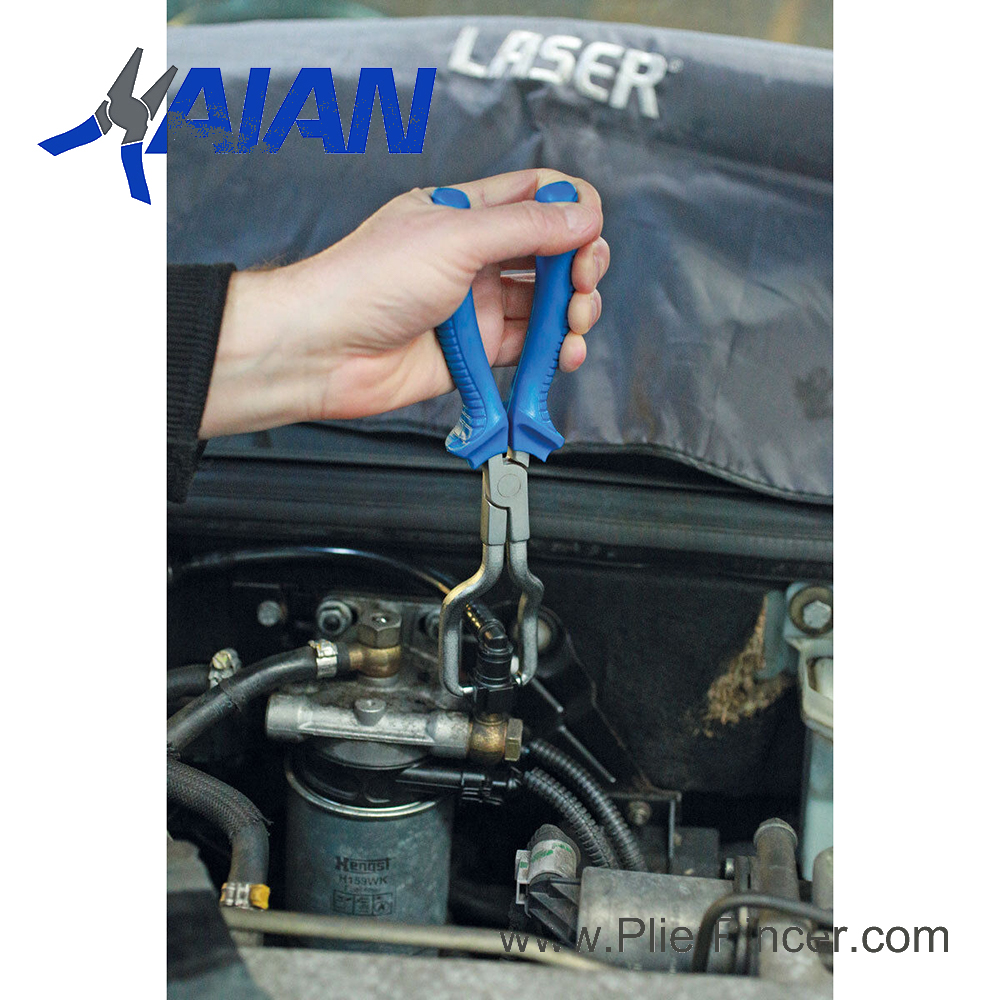
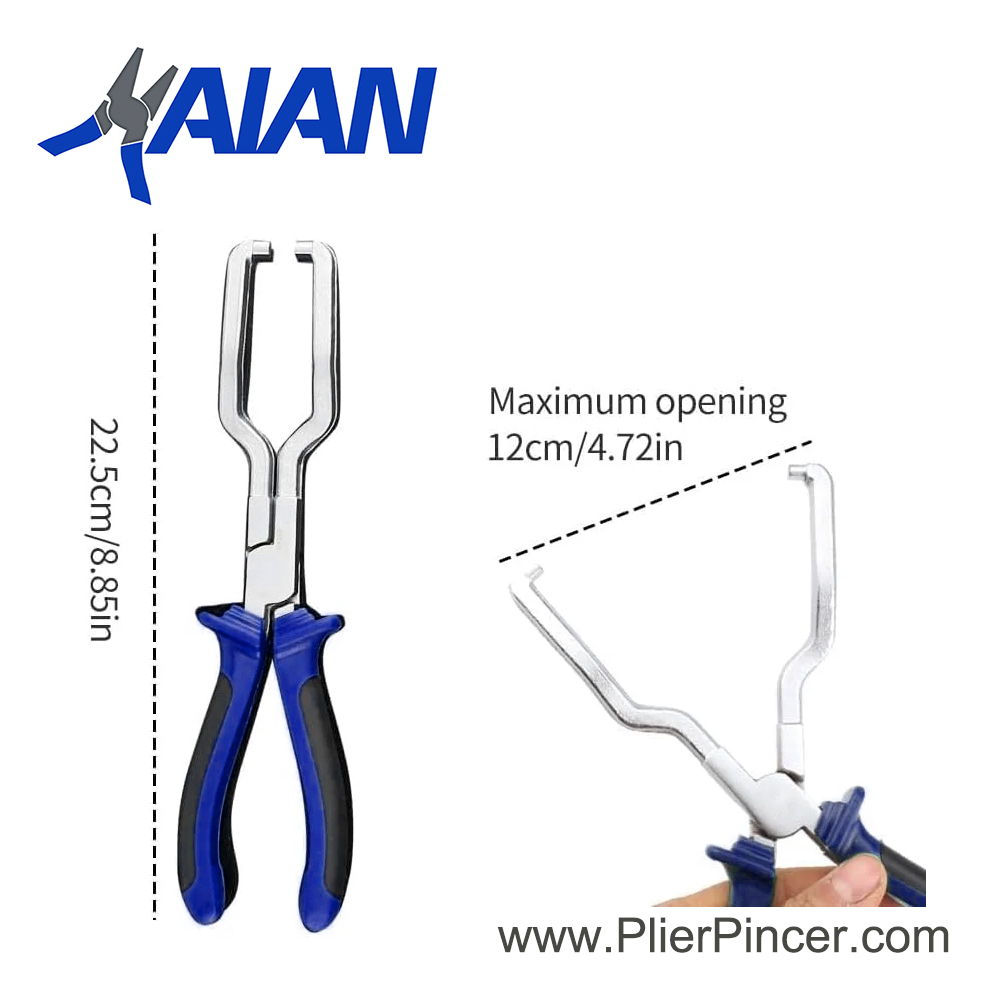
Fuel Line Clip Plier
For releasing connections on fuel lines during maintenance or when replacing fuel filters.
Designed to compress the quick disconnect lugs without damaging the connector.
Works on VW and Audi fuel lines with plastic snap-together connectors.
Mercedes M-Class fuel filters.
Ford, Mazda, Fiat, GM and BMW’s with gas powered engines.
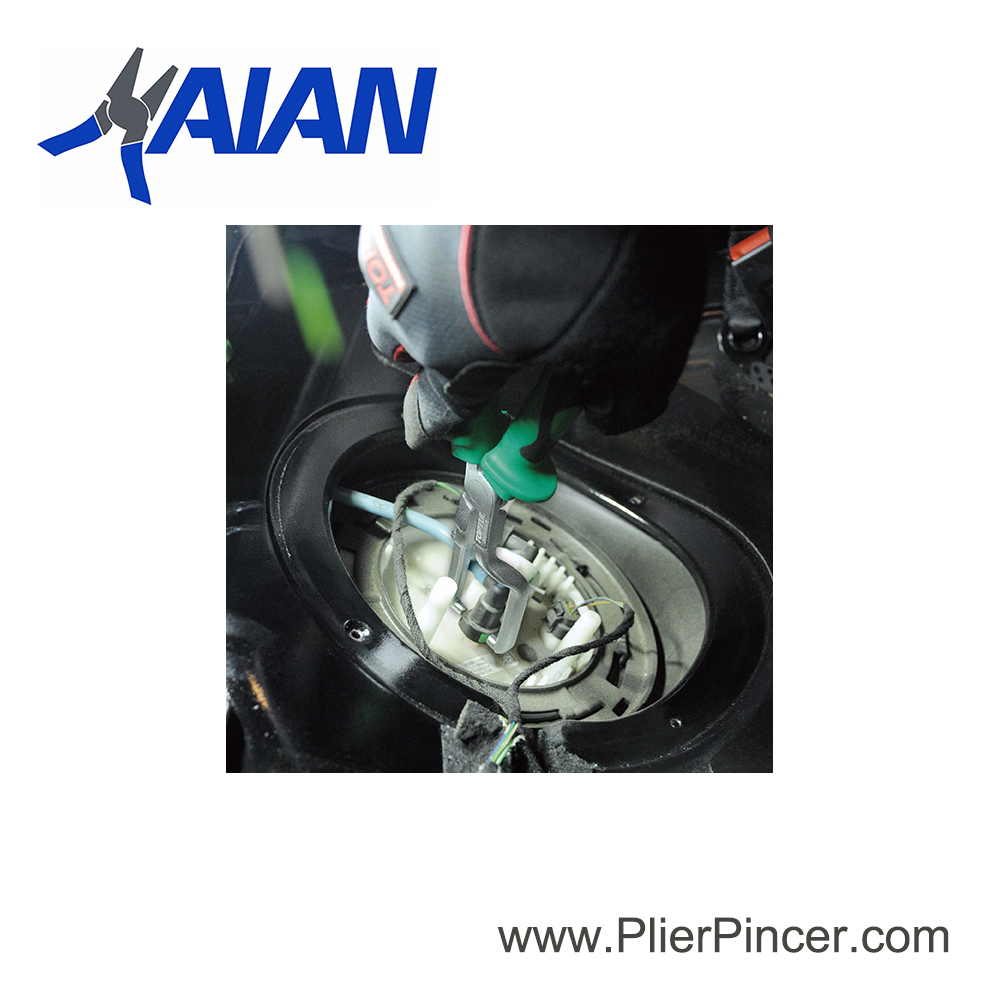
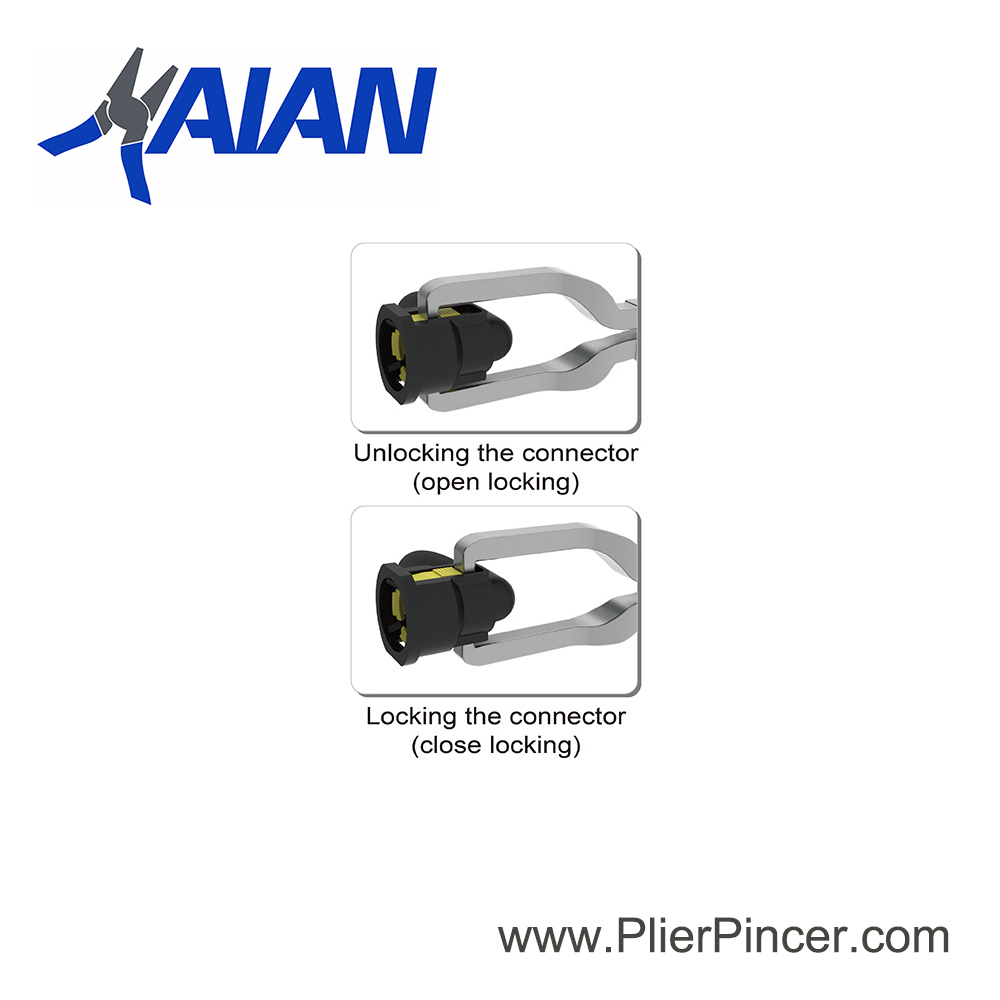
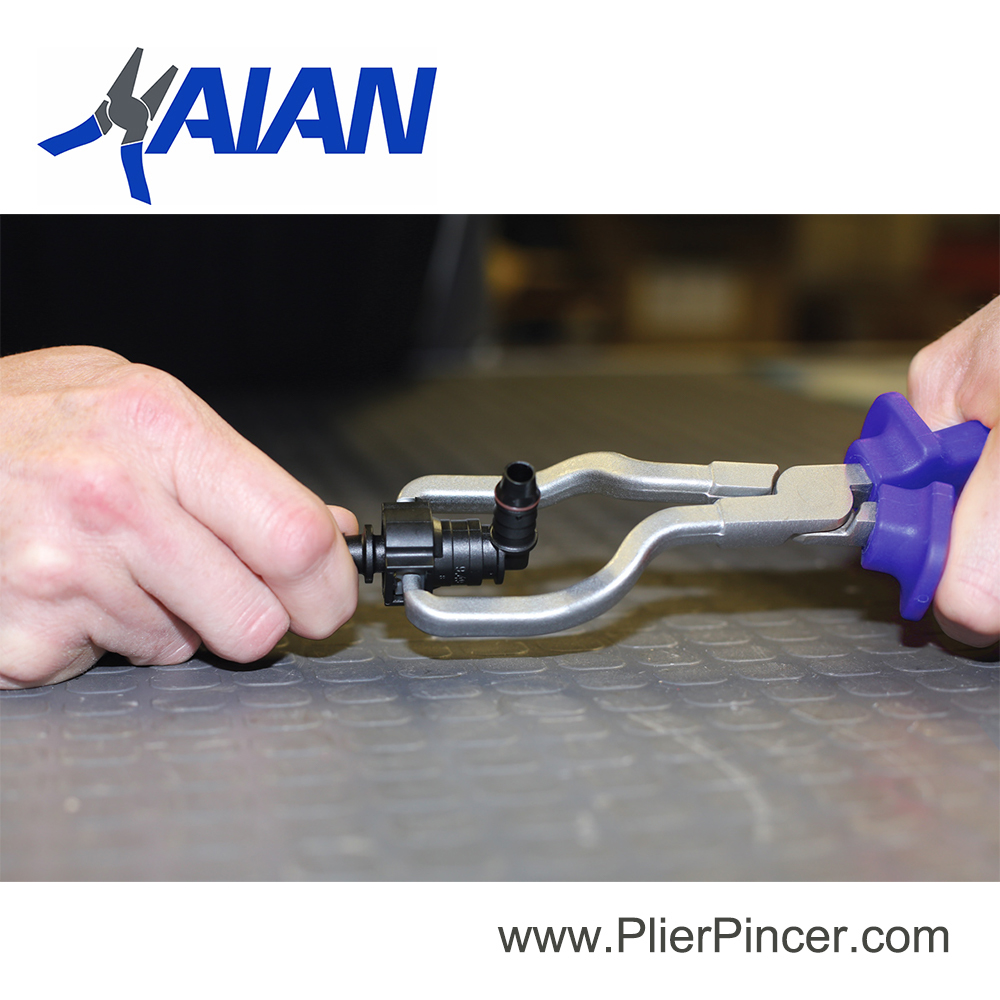
Release Fuel Lines With Ease Using Fuel Line Pliers
High-quality fuel line pliers are designed for durability. Find the essential tool for mechanics to tackle fuel system repairs easily.
1. What Are Fuel Line Pliers?
Fuel line pliers are a type of pliers that are specifically designed to work on fuel lines. They have a long, thin nose that is perfect for reaching into tight spots, and their angled jaws make it easy to grip and hold onto the fuel line. These hand tools are a must-have for an automotive technician!
2. When Replacing Fuel Filters, Do You Need Fuel Line Pliers When Releasing Connections?
Fuel filters are essential to any vehicle’s fuel system and should be replaced regularly to keep the engine running smoothly.
When replacing a fuel filter, it is crucial to use the proper tools to avoid damaging the fuel lines. Fuel line pliers are specially designed to release the connections without damaging them and should be used whenever possible.
While it is possible to release the connections with a regular pair of pliers, there is a much greater risk of damage, which could lead to leaks or other problems. Therefore, it is always best to use fuel line pliers when replacing fuel filters.
3. Do Gas-Powered Engines Use This Type of Tool?
Pliers are a vital part of any mechanic’s toolkit, and they come in various shapes and sizes to suit different tasks. However, one type of plier that is particularly useful for working on gas-powered engines is the fuel line plier. Fuel line pliers are designed to grip and remove fuel lines quickly and easily without damaging the line or the engine.
Final Thoughts About Fuel Line Pliers
Fuel line pliers are a must-have tool for any professional mechanic. They allow you to disconnect fuel lines easily and quickly without causing damage to the lines or fittings. The average customer ratings for fuel line pliers are 4.5 out of 5 stars, with reviewers recommending them as an essential tool for anyone who works on cars regularly.
When it’s time to tackle fuel line maintenance, you need the right tool for the job. You’re likely aware that a good fuel line disconnect tool can make all the difference in getting the task done efficiently and safely. But with so many options on the market, how do you choose the best one for your needs? You’re about to find out.
Factors to Consider When Choosing a Fuel Line Disconnect Tool
When selecting a fuel line disconnect tool, you’ll want to take into account a few key factors to make sure you get the right one for the job.
You’ll need to think about the tool’s material quality, whether it’s compatible with your vehicle, and how easy it’s to use.
Moreover, you’ll want to also consider the tool’s size range versatility, durability, and build to make certain it meets your specific needs.
Tool Material Quality
You’ll want to scrutinize the material quality of your fuel line disconnect tool, as it plays an essential role in determining the tool’s durability and longevity.
When it comes to material quality, you’ll want to opt for tools made from high-quality materials like steel or aluminum. These materials offer strength and resistance to wear and tear, guaranteeing your tool can withstand the demands of frequent use.
If you’re looking for a more budget-friendly option, durable plastic tools can be effective for occasional or light use. The material quality can impact the tool’s ability to withstand pressure and maintain functionality over time.
It’s vital to choose a tool with materials compatible with the types of fittings and lines you’ll be working on. This ensures efficient and reliable performance. By selecting a tool with high-quality materials, you can trust that it’ll get the job done efficiently and effectively.
Don’t compromise on material quality – it’s essential for a tool that’ll last you a long time.
Vehicle Compatibility Check
Before choosing a fuel line disconnect tool, make sure it’s vital with your vehicle’s specific make and model to avoid any potential issues or damage. You don’t want to risk damaging your fuel lines or the tool itself.
Check if the tool is designed to work with various types of fuel lines, including those in air conditioning systems and transmissions. You’ll also want to confirm that the tool’s size matches the fittings on your vehicle’s fuel lines.
Moreover, verify that the tool is suitable for the type of quick disconnect fittings commonly found in your vehicle’s fuel system. Compatibility with different vehicle brands like Ford, GM, Chrysler, and Mazda may vary, so it’s essential to validate the tool’s compatibility with your specific vehicle.
Take the time to research and choose a tool that’s compatible with your vehicle to ensure a smooth and safe repair process. By doing so, you’ll avoid costly mistakes and guarantee a successful repair.
Ease of Use Design
After ensuring your fuel line disconnect tool is compatible with your vehicle, it’s equally important to take into account a tool’s ease of use design, as it can greatly impact the efficiency and safety of your repair process. You’ll want a tool that’s comfortable to hold and maneuver, with an ergonomic design that reduces fatigue and strain.
Look for tools with angled or scissor-style designs, which can help you access tight spaces and hard-to-reach areas. Clear size markings are also essential, so you can quickly identify the right tool for the job. Moreover, opt for tools with a notch or mechanism to securely release the lock on the fuel line fittings.
As a DIY enthusiast or home mechanic, you’ll appreciate tools that are user-friendly and straightforward to operate. By prioritizing ease of use, you’ll be able to focus on the task at hand, rather than struggling with a complicated tool. By choosing a tool that’s easy to use, you’ll be able to complete your repair efficiently and safely.
Size Range Versatility
When working on various vehicles, having a fuel line disconnect tool with a diverse size range is essential, as it allows you to tackle different fuel line and AC cooling line fittings with ease.
You’ll want a tool that can accommodate a range of sizes, including 1/4′, 5/16′, 3/8′, 1/2′, 5/8′, 3/4′, and 7/8′, to make sure you’re prepared for whatever vehicle you’re working on.
A wider size range means you can work on fuel lines, heater lines, and AC cooling lines of different diameters, making your job more efficient and effective. Opting for a tool set with multiple size options will allow you to cover the majority of fuel line fittings in modern vehicles.
Durability and Build
As you select a fuel line disconnect tool, you’ll want to prioritize durability and build quality to guarantee that your tool can withstand the rigors of repeated use. A durable tool will save you time and frustration in the long run. Consider the material used in the tool’s construction, such as durable metal or hard plastic, for long-term reliability. Look for tools with sturdy build quality to withstand repeated use without breaking or bending. Features like anodized aluminum or steel components add strength and durability. Make sure the tool can handle the pressure and force needed for disconnecting fuel lines without wearing out quickly.
A well-built tool will make the job easier and safer. Opt for tools with clear size markings and color-coded sizing for easy identification and selection during use. By selecting a fuel line disconnect tool with a focus on durability and build, you’ll be able to tackle even the toughest jobs with confidence.
Frequently Asked Questions
Can I Use a Fuel Line Disconnect Tool on Diesel Engines?
You’re wondering if you can use a fuel line disconnect tool on diesel engines. Yes, you can! Diesel engines typically have similar fuel line connections as gas engines, so a standard fuel line disconnect tool will usually work just fine.
Are Fuel Line Disconnect Tools Compatible With All Vehicle Models?
You’re wondering if fuel line disconnect tools work with all vehicle models. Generally, they’re compatible with most, but you’ll want to check your vehicle’s specs to make sure the tool’s fittings match your fuel line’s size and type.
Can I Use a Fuel Line Disconnect Tool for Other Applications?
You’re wondering if that fuel line disconnect tool can be used for other tasks. While it’s primarily designed for fuel lines, you can repurpose it for other applications, like loosening stubborn hoses or fittings, but be cautious not to damage surrounding components.
Do Fuel Line Disconnect Tools Come With a Warranty or Guarantee?
You’re right to expect protection for your investment; surprisingly, most manufacturers offer a warranty or guarantee for their products, giving you peace of mind, and fuel line disconnect tools are no exception, typically coming with a 1-5 year warranty.
How Often Should I Clean and Maintain My Fuel Line Disconnect Tool?
You should regularly clean and maintain your tool after each use to prevent dirt and grime buildup, ideally with a soft cloth and mild soap, to guarantee its longevity and best performance.
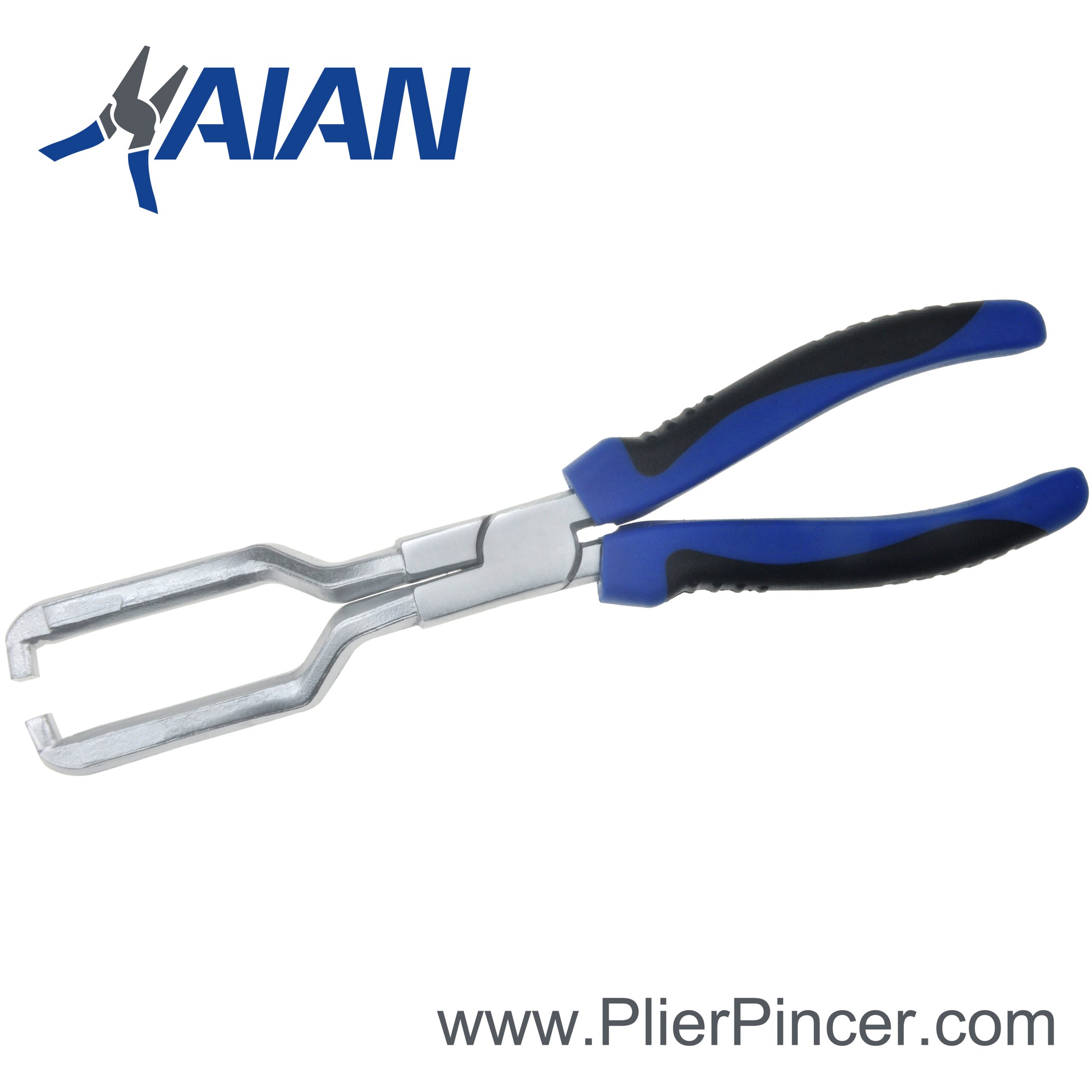
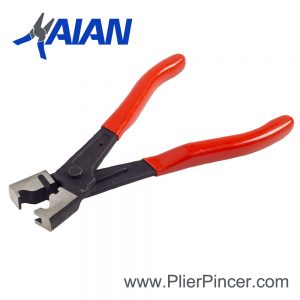
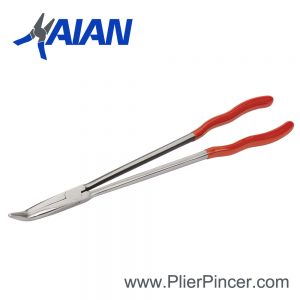
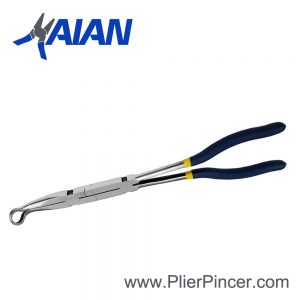
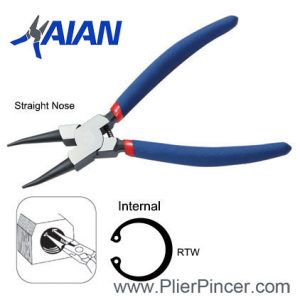
Sivan –
A must have tool for machinists when they rapair a car or van.